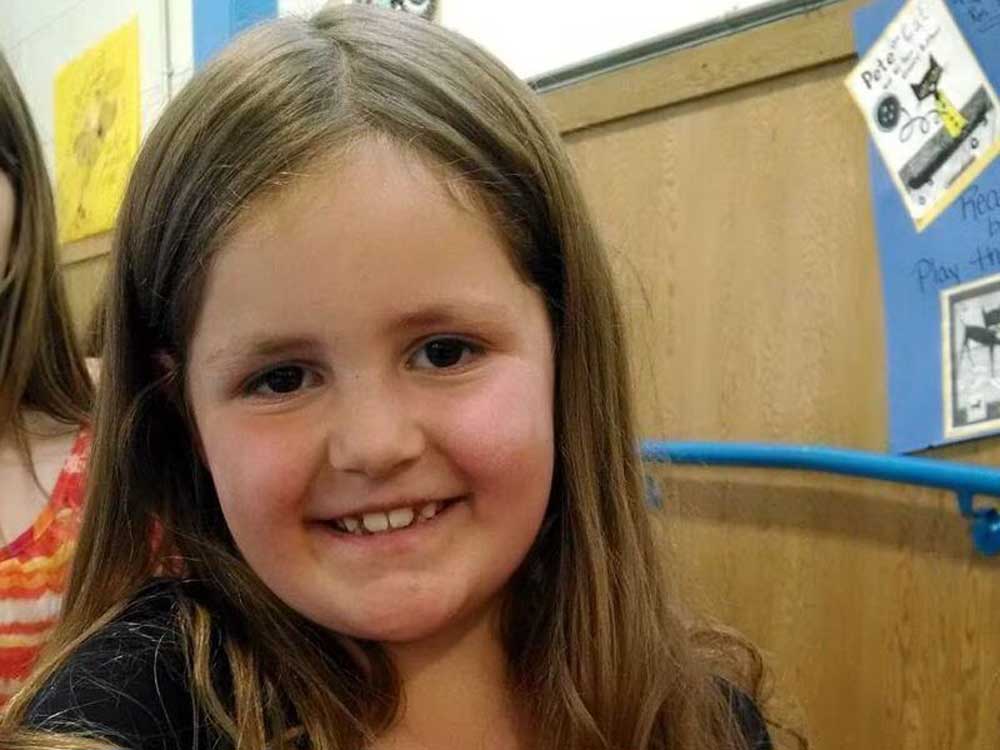Klamath County girl, 14, died in squalid conditions despite relatives’ pleas to child welfare officials
Published 6:00 am Thursday, April 13, 2023

- Fallon Murdock is pictured in an undated photo. She died on March 30 at her family's home in the Klamath County unincorporated community of Keno. For several years, relatives had reported concerns to Oregon child protective services that Fallon's parents were neglecting her and her four siblings.
Family members of a 14-year-old Klamath County girl who died in late March are raising alarms that Oregon’s child protective agency failed to intervene to keep her safe, despite what they say were multiple reports of neglect and possible abuse.
By the time Fallon Murdock died on March 30, her maternal grandmother Diane Spahn and great aunt Barbie Campbell had contacted the state’s child abuse and neglect hotline five times over a four-year period with concerns about the safety of Fallon and her four siblings, Campbell said. Neighbors also reported concerns to child welfare officials, Campbell said, yet the state apparently did not step in until after Fallon’s death.
The Klamath County Sheriff’s Office is investigating Fallon’s death. And three family members said they heard from law enforcement officers who visited the home in the unincorporated community of Keno that the five children, ages 6 through 15, had been living in outbuildings without toilets or heat because the primary home was uninhabitable.
Officers leaving the property “had to change their shoes because the entire property was so covered in feces and urine,” said Dan Campbell, the children’s maternal grandfather. “It’s just heartbreaking.”
Brandon Fowler, public information officer for the Klamath County Sheriff’s Office, confirmed Monday that the office is investigating Fallon’s death. And 911 call records show that law enforcement was repeatedly called to the home where Fallon lived southwest of Klamath Falls on March 30.
Heidi Vaughn, a protective services caseworker for Oregon child welfare in Klamath County, told a judge during an April 5 hearing on the state’s rationale for taking custody of the children that “the home had a significant amount of urine, feces, garbage and was generally unsafe for any aged child.” The home also contained drug paraphernalia and a substance that the father, Chris Murdock, identified to authorities as methamphetamine, Vaughn said.
The parents failed to meet the children’s educational and medical needs, including by taking the three oldest children out of school after 2019, she said. “They were, for a very short amount of time, in online education,” Vaughn said. “But for this last proper school year they have had no education.” The last school the oldest boy, 15, attended was an elementary school, Vaughn said.
Chris and Karana Murdock also stopped getting routine medical care for their children after 2019, Vaughn said. The parents imposed “excessive discipline” on the 15-year-old in the form of “extensive physical workouts that could range from 45 minutes to 4 hours, Vaughn said, resulting in him throwing up, passing out, not being able to appropriately control his own body.”
Jake Sunderland, spokesperson for the Department of Human Services, said the agency cannot comment on any specific case due to privacy laws. “Anytime a child dies, it is a tragedy for their family, friends and community,” Sunderland wrote in an email Monday. “As I am sure you can appreciate, due to child privacy laws we cannot comment on, or even confirm or deny the existence of, child welfare cases.”
Sunderland said he encourages anyone with concerns about the welfare of the children to contact the state’s child abuse hotline, (855) 503-7233, where people can anonymously share their concerns.
In Oregon, the state is required to complete a review every time a child dies of abuse if that child was in the custody of the state or came in contact with the child welfare system in some other way in the preceding 12 months, such as a hotline report of neglect or abuse.
Ashley Gathard, Fallon’s biological mother, lost custody of her daughter during a time when Gathard was struggling with addiction and serving sentences for a variety of crimes. She said that law enforcement told her that first responders found Fallon unresponsive in a bathtub in one of the buildings on the property.
“She’d been complaining she was sick, she had a headache and stuff,”Gathard said. So the parents who adopted her after Gathard give up custody, Chris and Karana Murdock, went to the store to purchase pain relievers, Gathard said, citing information she received from law enforcement. Gathard, who was previously married to Chris Murdock, said she was told that early results of a medical examination suggested that her biological daughter had spinal meningitis.
Murdock is not the biological parent of Fallon but he is the biological parent of the 15-year-old, Gathard said.
“I wasn’t a fit mom and I wanted my kids to have a good life,” said Gathard, who is now in recovery and has a family in Wisconsin. Instead, Gathard said, she learned from law enforcement that there was “clear presence of drug use” in the home and the children were relieving themselves in a sewage pond on the property.
Gathard traveled to Klamath Falls upon learning of Fallon’s death and held a candlelight vigil for her on Saturday. Gathard wants her 15-year-old son, who was also living with the Murdocks, to know she is trying to get custody of him. “I’m here for you and I won’t stop fighting for you.”
Gathard said she is concerned that local child protective services employees decided to place the 15-year-old boy and Chris and Karana’s three other children — ages 6, 9 and 12 — with Chris Murdock’s parents, Bonnie and Ken Murdock. She worried about that placement because she said the couple have maintained that the children were never mistreated.
“I just really want justice for my daughter,” Gathard said. “She was slipped through the (Oregon Department of Human Services) cracks … Bonnie has pull here.”
Bonnie Murdock recently worked at a Klamath Falls law firm and now works at Klamath County Justice Court.
She did not return a phone call seeking comment Tuesday.
Ken Murdock wrote on Facebook following Fallon’s death that she “was a happy health girl right up to the time of her passing.”
In an interview Tuesday, he said he and his wife took care of the children every other weekend. “We monitored them very carefully,” he said. “They were very happy, well-adjusted children.”
Regarding the primitive and unsanitary conditions in which the children lived, Ken Murdock said he “wouldn’t let kids live there,” but he said he and his wife were unaware of the conditions because they had not been to the property in a while.
“This is just a typical meth issue family,” Ken Murdock said.
Ken Murdock said he and his wife take good care of their grandchildren. “You can ask anybody in this community what kind of people we are, and they will stand up behind us,” Murdock said. “My wife runs justice court. She is involved in the legal system.”
Baylea Scott, a childhood friend of Karana Murdock who said she ended the friendship after Karana started using methamphetamine, said she works a shift at a Klamath-area Walmart that starts at 10 p.m. She said she often observed her childhood friend visiting the store around that time with Fallon and a younger sister. “The last time I saw Fallon, they cannot tell me that was a happy kid,” said Scott, who used to help care for Karana Murdock’s children. “That girl had the saddest eyes I have ever seen.”
“Every time I saw these kids in the store, they didn’t make sounds,” Scott said. “I grew up in a super abusive home and that’s what it reminded me of, going shopping with my mom and siblings.”
Chris and Karana Murdock cut off contact with Karana Murdock’s family members who raised concerns about the couple’s drug use and neglect of the children, those family members said.
“Four years ago, they kind of dropped off the face of the earth,” said Barbie Campbell, the maternal great aunt. At the same time, people living in the Murdock’s neighborhood were “just telling us constantly how bad it is … Their septic tank has been broken for years and there’s a poop pond in the backyard that the kids fell in.”
Dan Campbell, Karana’s father, said he and Barbie Campbell “knew the house was not very good living conditions because my daughter would not let us go out to the house.”
Dan Campbell said he believes the first person to report potential neglect or abuse to child protective services was Karana’s mother, Diane Spahn, approximately four years ago. “She was concerned about all the drug use and the strange men at the house and neglect of the children,” Campbell said.
Barbie Campbell said the last report she filed with Oregon child protective services was in August 2022. “This could be prevented,” Barbie Campbell said. “(Fallon) did not have a fair chance at life … It’s heartbreaking that this had to happen this way and for (Department of Human Services) to be so blind here in Klamath Falls.”
Fallon was a “sweet and loving” kid who cared for her siblings, including walking to the local market to get groceries for them to eat or asking for food from a neighbor, Barbie Campbell said.
Campbell said she is worried that Fallon’s four siblings are not safe in the care of their paternal grandparents, because Chris Murdock has keys to his parents’ house and has lived off-and-on with his parents.
“(Bonnie Murdock) is never going to keep those kids away from Chris,” Barbie Campbell said.
Dan Campbell said he is also concerned that the children are not safe in their paternal grandparents’ care, based on what he described as their history of brushing off concerns about neglect and abuse. “Instead of getting help for the grandkids, they have chosen to protect the son and ignore all of this,” he said.
In a text message exchange with Bonnie Murdock in October 2020, Dan Campbell asked if she had seen Chris and Karana Murdock recently because he had heard from “multiple credible sources” that the couple was “heavily doing drugs including meth” and subjecting their children to extreme neglect including with “weird men and drugs in front of the children … We all must intervene as grandparents for the sake of these babies and their mental health and their future.”
In a text message back to Dan Campbell, Bonnie Murdock chastised Campbell and other relatives for contacting child protective services and suggested that instead they should give Chris food and money to pay the electric bill. “I see them all the time, they’re doing great,” Bonnie Murdock wrote. “Chris and Karana would never do anything to hurt their kids.”
Bonnie Murdock could not be reached by phone at the Justice Court on Tuesday morning.
Fallon “was such a sweet soul,” Dan Campbell said. If state caseworkers had intervened, Campbell said, perhaps it could have pushed his daughter to seek treatment. He said he is still holding out hope that she can turn her life around.





